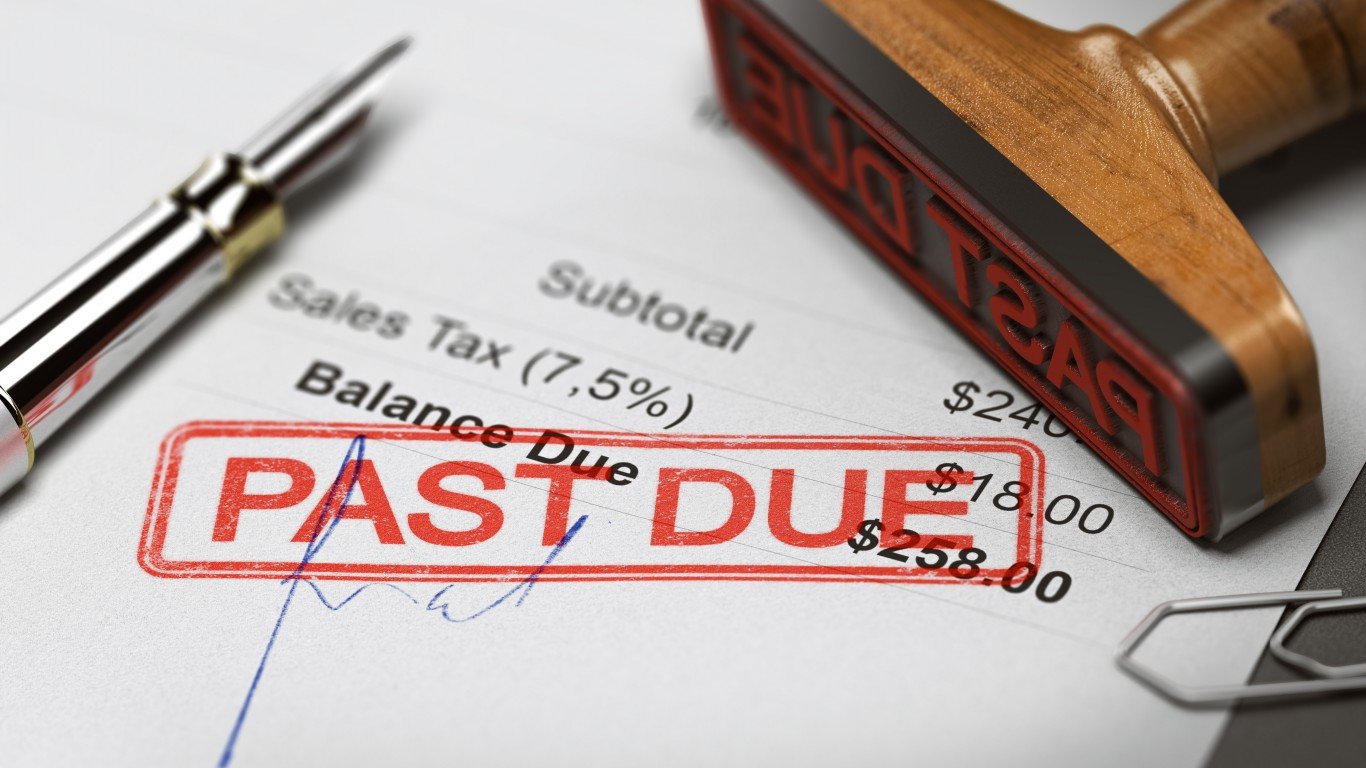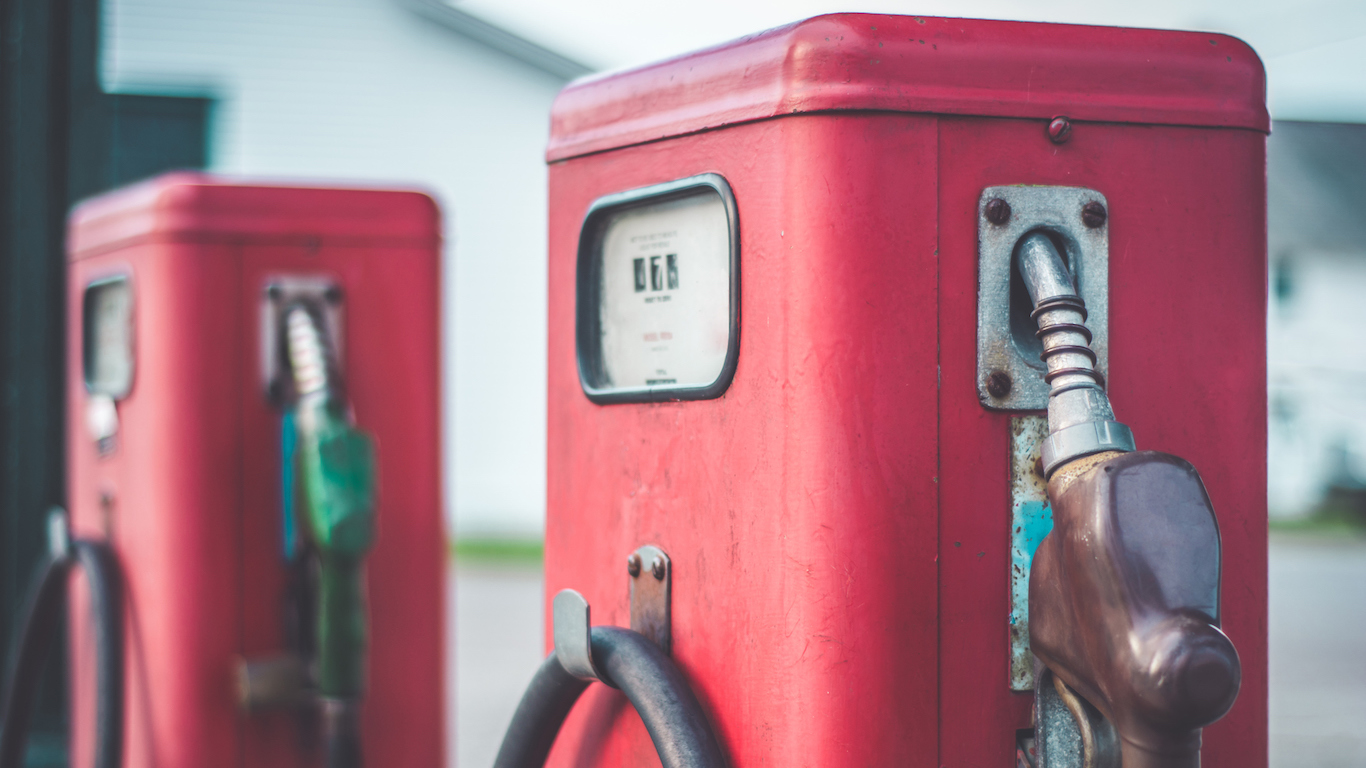

Debt. Nobody likes it, but we all have some amount of debt on our household ledger. 2020 was a strange year in terms of household finances — on the one hand, many Americans were suddenly out of a job; on the other hand, expenses on many items declined and the government sent help. Still, according to a report from the Federal Reserve, household debt hit $14.6 trillion — that’s trillion with a T — at the end of 2020, a rise of $414 billion.
Much of that debt was driven by people taking advantage of low interest rates to refinance their homes or buy new houses far from crowded cities as remote work made commuting less of a necessity. Mortgage debt passed over $10 trillion for the first time ever, an increase of $486 billion during 2020. This is the top city Americans are moving to.
While student debt and auto debt also increased, albeit at much a more modest pace, consumers were apparently keeping a close check on their credit card accounts, even if their paychecks have shrunk. Credit card debt actually dropped by $108 billion to $820 billion, the Federal Reserve reports. Stimulus checks may have had a hand in bringing down credit card debt.
To identify how many people in each state are burdened by credit card debt, 24/7 Wall St. reviewed data from Urban Institute’s “Credit Health During the COVID-19 Pandemic.” We ranked states by the credit card delinquency rate — the share of consumers with a credit or charge card who are 30 or more days delinquent — as of October 2020, the latest available. Additional data from the report includes each state’s median credit score, also for October 2020.
Nationwide, the credit card delinquency rate decreased to 4.06% in October 2020 from 5.92% in February 2020. Median credit scores were up in the meantime, from 693 in February 2020 to 704 nine months later. (These are the states with the most mortgage debt.)
Across all states, credit card delinquency rates — accounts 30-plus days in arrears — range from 2.65% to 6.73%. States with higher poverty rates and a higher share of people without medical insurance, the uninsured rate, tend to have higher credit card delinquency rates and lower credit scores.
Unfortunately, the pandemic may have forced more people into poverty. According to the Census Bureau, the U.S. poverty rate last year rose 1.0 percentage points to 11.4% from 10.5% in 2019. That reversed a five-year decline in the poverty rate.
Not only poverty has increased in 2020, unemployment did too. The annual unemployment rate in 2020 was 8.1%, according to the Bureau of Labor Statistics, reaching a 14.8% peak in April 2020. The jobless rate has been on a downward trend since, declining to 4.6% this past October. As more people return to work, they’ll have more money in their pockets to spend — and perhaps further slash their debt burden.
Click here to see how many people in your state are burdened by credit card debt
To identify how many people in each state are burdened by credit card debt, 24/7 Wall St. reviewed data from the nonprofit think tank Urban Institute’s Credit Health During the COVID-19 Pandemic feature. We ranked states by the credit card delinquency rate — the share of consumers with a credit or charge card who are 30 or more days delinquent — as of October 2020, the latest available.
Each state’s median credit score — median Vantage score (300 to 850) of people with a credit bureau record — are also from the Urban Institute report and are for October 2020, the most recent available. The Urban Institute dataset contains information derived from de-identified, consumer-level records from a major credit bureau nationwide.
Additional data on poverty rate and uninsured rate are annual estimates from the Census Bureau’s 2019 American Community Survey. Data on 2020 unemployment rate came from the Bureau of Labor Statistics.

49. Minnesota
> Credit card delinquency rate (30+ days): 2.65%
> Median credit score: 738 — the highest
> Poverty rate 2019: 9.0% — 3rd lowest
> Unemployment rate 2020: 6.2% — 18th lowest
> Uninsured rate 2019: 4.9% — 5th lowest
[in-text-ad]

49. Wisconsin
> Credit card delinquency rate (30+ days): 2.65%
> Median credit score: 729 — 2nd highest
> Poverty rate 2019: 10.4% — 16th lowest
> Unemployment rate 2020: 6.3% — 19th lowest
> Uninsured rate 2019: 5.7% — 8th lowest

48. Washington
> Credit card delinquency rate (30+ days): 2.88%
> Median credit score: 725 — 7th highest
> Poverty rate 2019: 9.8% — 9th lowest
> Unemployment rate 2020: 8.4% — 11th highest
> Uninsured rate 2019: 6.6% — 17th lowest

46. Montana
> Credit card delinquency rate (30+ days): 2.90%
> Median credit score: 718 — 13th highest
> Poverty rate 2019: 12.6% — 20th highest
> Unemployment rate 2020: 5.9% — 12th lowest
> Uninsured rate 2019: 8.3% — 24th highest
[in-text-ad-2]

46. Vermont
> Credit card delinquency rate (30+ days): 2.90%
> Median credit score: 727 — 4th highest
> Poverty rate 2019: 10.2% — 15th lowest
> Unemployment rate 2020: 5.6% — 8th lowest
> Uninsured rate 2019: 4.5% — 4th lowest

45. North Dakota
> Credit card delinquency rate (30+ days): 2.93%
> Median credit score: 726 — 5th highest
> Poverty rate 2019: 10.6% — 17th lowest
> Unemployment rate 2020: 5.1% — 4th lowest
> Uninsured rate 2019: 6.9% — 19th lowest
[in-text-ad]

44. Oregon
> Credit card delinquency rate (30+ days): 2.98%
> Median credit score: 718 — 13th highest
> Poverty rate 2019: 11.4% — 23rd lowest
> Unemployment rate 2020: 7.6% — 22nd highest
> Uninsured rate 2019: 7.2% — 20th lowest

43. Iowa
> Credit card delinquency rate (30+ days): 3.12%
> Median credit score: 724 — 9th highest
> Poverty rate 2019: 11.2% — 20th lowest
> Unemployment rate 2020: 5.3% — 5th lowest
> Uninsured rate 2019: 5.0% — 6th lowest

42. Utah
> Credit card delinquency rate (30+ days): 3.19%
> Median credit score: 712 — 18th highest
> Poverty rate 2019: 8.9% — 2nd lowest
> Unemployment rate 2020: 4.7% — 3rd lowest
> Uninsured rate 2019: 9.7% — 18th highest
[in-text-ad-2]

41. Idaho
> Credit card delinquency rate (30+ days): 3.22%
> Median credit score: 712 — 18th highest
> Poverty rate 2019: 11.2% — 21st lowest
> Unemployment rate 2020: 5.4% — 7th lowest
> Uninsured rate 2019: 10.8% — 12th highest

40. South Dakota
> Credit card delinquency rate (30+ days): 3.25%
> Median credit score: 725 — 7th highest
> Poverty rate 2019: 11.9% — 23rd highest
> Unemployment rate 2020: 4.6% — 2nd lowest
> Uninsured rate 2019: 10.2% — 13th highest
[in-text-ad]

39. Wyoming
> Credit card delinquency rate (30+ days): 3.29%
> Median credit score: 705 — 24th highest
> Poverty rate 2019: 10.1% — 14th lowest
> Unemployment rate 2020: 5.8% — 9th lowest
> Uninsured rate 2019: 12.3% — 6th highest

38. Colorado
> Credit card delinquency rate (30+ days): 3.32%
> Median credit score: 720 — 11th highest
> Poverty rate 2019: 9.3% — 7th lowest
> Unemployment rate 2020: 7.3% — 25th highest
> Uninsured rate 2019: 8.0% — 25th lowest

37. New Hampshire
> Credit card delinquency rate (30+ days): 3.33%
> Median credit score: 726 — 5th highest
> Poverty rate 2019: 7.3% — the lowest
> Unemployment rate 2020: 6.7% — 22nd lowest
> Uninsured rate 2019: 6.3% — 13th lowest
[in-text-ad-2]

35. Maine
> Credit card delinquency rate (30+ days): 3.34%
> Median credit score: 711 — 20th highest
> Poverty rate 2019: 10.9% — 19th lowest
> Unemployment rate 2020: 5.4% — 7th lowest
> Uninsured rate 2019: 8.0% — 25th highest

35. Michigan
> Credit card delinquency rate (30+ days): 3.34%
> Median credit score: 703 — 23rd lowest
> Poverty rate 2019: 13.0% — 17th highest
> Unemployment rate 2020: 9.9% — 5th highest
> Uninsured rate 2019: 5.8% — 10th lowest
[in-text-ad]

33. Massachusetts
> Credit card delinquency rate (30+ days): 3.37%
> Median credit score: 729 — 2nd highest
> Poverty rate 2019: 9.4% — 8th lowest
> Unemployment rate 2020: 8.9% — 10th highest
> Uninsured rate 2019: 3.0% — the lowest

33. Nebraska
> Credit card delinquency rate (30+ days): 3.37%
> Median credit score: 722 — 10th highest
> Poverty rate 2019: 9.9% — 10th lowest
> Unemployment rate 2020: 4.2% — the lowest
> Uninsured rate 2019: 8.3% — 23rd highest

32. Hawaii
> Credit card delinquency rate (30+ days): 3.46%
> Median credit score: 720 — 11th highest
> Poverty rate 2019: 9.3% — 6th lowest
> Unemployment rate 2020: 11.6% — 2nd highest
> Uninsured rate 2019: 4.2% — 3rd lowest
[in-text-ad-2]

31. Kansas
> Credit card delinquency rate (30+ days): 3.49%
> Median credit score: 704 — 25th highest
> Poverty rate 2019: 11.4% — 24th lowest
> Unemployment rate 2020: 5.9% — 12th lowest
> Uninsured rate 2019: 9.2% — 19th highest

30. Rhode Island
> Credit card delinquency rate (30+ days): 3.50%
> Median credit score: 708 — 22nd highest
> Poverty rate 2019: 10.8% — 18th lowest
> Unemployment rate 2020: 9.4% — 8th highest
> Uninsured rate 2019: 4.1% — 2nd lowest
[in-text-ad]

29. Pennsylvania
> Credit card delinquency rate (30+ days): 3.64%
> Median credit score: 716 — 15th highest
> Poverty rate 2019: 12.0% — 22nd highest
> Unemployment rate 2020: 9.1% — 9th highest
> Uninsured rate 2019: 5.8% — 9th lowest

28. Alaska
> Credit card delinquency rate (30+ days): 3.65%
> Median credit score: 690 — 20th lowest
> Poverty rate 2019: 10.1% — 13th lowest
> Unemployment rate 2020: 7.8% — 19th highest
> Uninsured rate 2019: 12.2% — 7th highest

27. Virginia
> Credit card delinquency rate (30+ days): 3.66%
> Median credit score: 706 — 23rd highest
> Poverty rate 2019: 9.9% — 11th lowest
> Unemployment rate 2020: 6.2% — 18th lowest
> Uninsured rate 2019: 7.9% — 24th lowest
[in-text-ad-2]

26. California
> Credit card delinquency rate (30+ days): 3.69%
> Median credit score: 704 — 25th highest
> Poverty rate 2019: 11.8% — 25th highest
> Unemployment rate 2020: 10.1% — 3rd highest
> Uninsured rate 2019: 7.7% — 22nd lowest

25. New Jersey
> Credit card delinquency rate (30+ days): 3.71%
> Median credit score: 711 — 20th highest
> Poverty rate 2019: 9.2% — 5th lowest
> Unemployment rate 2020: 9.8% — 6th highest
> Uninsured rate 2019: 7.9% — 23rd lowest
[in-text-ad]

24. Illinois
> Credit card delinquency rate (30+ days): 3.75%
> Median credit score: 704 — 25th highest
> Poverty rate 2019: 11.5% — 25th lowest
> Unemployment rate 2020: 9.5% — 7th highest
> Uninsured rate 2019: 7.4% — 21st lowest

23. Connecticut
> Credit card delinquency rate (30+ days): 3.83%
> Median credit score: 716 — 15th highest
> Poverty rate 2019: 10.0% — 12th lowest
> Unemployment rate 2020: 7.9% — 17th highest
> Uninsured rate 2019: 5.9% — 11th lowest
22. Missouri
> Credit card delinquency rate (30+ days): 3.93%
> Median credit score: 689 — 18th lowest
> Poverty rate 2019: 12.9% — 18th highest
> Unemployment rate 2020: 6.1% — 15th lowest
> Uninsured rate 2019: 10.0% — 15th highest
[in-text-ad-2]
21. Ohio
> Credit card delinquency rate (30+ days): 3.98%
> Median credit score: 691 — 21st lowest
> Poverty rate 2019: 13.1% — 15th highest
> Unemployment rate 2020: 8.1% — 15th highest
> Uninsured rate 2019: 6.6% — 16th lowest

19. Delaware
> Credit card delinquency rate (30+ days): 3.99%
> Median credit score: 690 — 20th lowest
> Poverty rate 2019: 11.3% — 22nd lowest
> Unemployment rate 2020: 7.8% — 19th highest
> Uninsured rate 2019: 6.6% — 15th lowest
[in-text-ad]

19. New York
> Credit card delinquency rate (30+ days): 3.99%
> Median credit score: 713 — 17th highest
> Poverty rate 2019: 13.0% — 16th highest
> Unemployment rate 2020: 10.0% — 4th highest
> Uninsured rate 2019: 5.2% — 7th lowest

18. Arizona
> Credit card delinquency rate (30+ days): 4.05%
> Median credit score: 684 — 17th lowest
> Poverty rate 2019: 13.5% — 13th highest
> Unemployment rate 2020: 7.9% — 17th highest
> Uninsured rate 2019: 11.3% — 9th highest

17. Indiana
> Credit card delinquency rate (30+ days): 4.16%
> Median credit score: 682 — 16th lowest
> Poverty rate 2019: 11.9% — 24th highest
> Unemployment rate 2020: 7.1% — 24th lowest
> Uninsured rate 2019: 8.7% — 22nd highest
[in-text-ad-2]

16. New Mexico
> Credit card delinquency rate (30+ days): 4.32%
> Median credit score: 670 — 9th lowest
> Poverty rate 2019: 18.2% — 3rd highest
> Unemployment rate 2020: 8.4% — 11th highest
> Uninsured rate 2019: 10.0% — 16th highest

15. Maryland
> Credit card delinquency rate (30+ days): 4.35%
> Median credit score: 695 — 22nd lowest
> Poverty rate 2019: 9.0% — 4th lowest
> Unemployment rate 2020: 6.8% — 23rd lowest
> Uninsured rate 2019: 6.0% — 12th lowest
[in-text-ad]

14. Tennessee
> Credit card delinquency rate (30+ days): 4.38%
> Median credit score: 675 — 13th lowest
> Poverty rate 2019: 13.9% — 9th highest
> Unemployment rate 2020: 7.5% — 24th highest
> Uninsured rate 2019: 10.1% — 14th highest

13. Kentucky
> Credit card delinquency rate (30+ days): 4.59%
> Median credit score: 675 — 13th lowest
> Poverty rate 2019: 16.3% — 4th highest
> Unemployment rate 2020: 6.6% — 21st lowest
> Uninsured rate 2019: 6.4% — 14th lowest

12. Oklahoma
> Credit card delinquency rate (30+ days): 4.68%
> Median credit score: 667 — 7th lowest
> Poverty rate 2019: 15.2% — 8th highest
> Unemployment rate 2020: 6.1% — 15th lowest
> Uninsured rate 2019: 14.3% — 2nd highest
[in-text-ad-2]

11. North Carolina
> Credit card delinquency rate (30+ days): 4.75%
> Median credit score: 678 — 14th lowest
> Poverty rate 2019: 13.6% — 12th highest
> Unemployment rate 2020: 7.3% — 25th highest
> Uninsured rate 2019: 11.3% — 10th highest

10. Texas
> Credit card delinquency rate (30+ days): 4.84%
> Median credit score: 666 — 5th lowest
> Poverty rate 2019: 13.6% — 11th highest
> Unemployment rate 2020: 7.6% — 22nd highest
> Uninsured rate 2019: 18.4% — the highest
[in-text-ad]

9. South Carolina
> Credit card delinquency rate (30+ days): 4.91%
> Median credit score: 668 — 8th lowest
> Poverty rate 2019: 13.8% — 10th highest
> Unemployment rate 2020: 6.2% — 18th lowest
> Uninsured rate 2019: 10.8% — 11th highest

8. West Virginia
> Credit card delinquency rate (30+ days): 5.03%
> Median credit score: 671 — 10th lowest
> Poverty rate 2019: 16.0% — 6th highest
> Unemployment rate 2020: 8.3% — 13th highest
> Uninsured rate 2019: 6.7% — 18th lowest

7. Alabama
> Credit card delinquency rate (30+ days): 5.06%
> Median credit score: 665 — 4th lowest
> Poverty rate 2019: 15.5% — 7th highest
> Unemployment rate 2020: 5.9% — 12th lowest
> Uninsured rate 2019: 9.7% — 17th highest
[in-text-ad-2]

6. Florida
> Credit card delinquency rate (30+ days): 5.12%
> Median credit score: 680 — 15th lowest
> Poverty rate 2019: 12.7% — 19th highest
> Unemployment rate 2020: 7.7% — 21st highest
> Uninsured rate 2019: 13.2% — 4th highest

5. Louisiana
> Credit card delinquency rate (30+ days): 5.25%
> Median credit score: 660 — 2nd lowest
> Poverty rate 2019: 19.0% — 2nd highest
> Unemployment rate 2020: 8.3% — 13th highest
> Uninsured rate 2019: 8.9% — 21st highest
[in-text-ad]

4. Nevada
> Credit card delinquency rate (30+ days): 5.30%
> Median credit score: 672 — 11th lowest
> Poverty rate 2019: 12.5% — 21st highest
> Unemployment rate 2020: 12.8% — the highest
> Uninsured rate 2019: 11.4% — 8th highest

3. Georgia
> Credit card delinquency rate (30+ days): 5.52%
> Median credit score: 665 — 4th lowest
> Poverty rate 2019: 13.3% — 14th highest
> Unemployment rate 2020: 6.5% — 20th lowest
> Uninsured rate 2019: 13.4% — 3rd highest

2. Arkansas
> Credit card delinquency rate (30+ days): 5.63%
> Median credit score: 667 — 7th lowest
> Poverty rate 2019: 16.2% — 5th highest
> Unemployment rate 2020: 6.1% — 15th lowest
> Uninsured rate 2019: 9.1% — 20th highest
[in-text-ad-2]

1. Mississippi
> Credit card delinquency rate (30+ days): 6.73%
> Median credit score: 653 — the lowest
> Poverty rate 2019: 19.6% — the highest
> Unemployment rate 2020: 8.1% — 15th highest
> Uninsured rate 2019: 13.0% — 5th highest
Essential Tips for Investing: Sponsored
A financial advisor can help you understand the advantages and disadvantages of investment properties. Finding a qualified financial advisor doesn’t have to be hard. SmartAsset’s free tool matches you with up to three financial advisors who serve your area, and you can interview your advisor matches at no cost to decide which one is right for you. If you’re ready to find an advisor who can help you achieve your financial goals, get started now.
Investing in real estate can diversify your portfolio. But expanding your horizons may add additional costs. If you’re an investor looking to minimize expenses, consider checking out online brokerages. They often offer low investment fees, helping you maximize your profit.
Thank you for reading! Have some feedback for us?
Contact the 24/7 Wall St. editorial team.
 24/7 Wall St.
24/7 Wall St. 24/7 Wall St.
24/7 Wall St. 24/7 Wall St.
24/7 Wall St.




